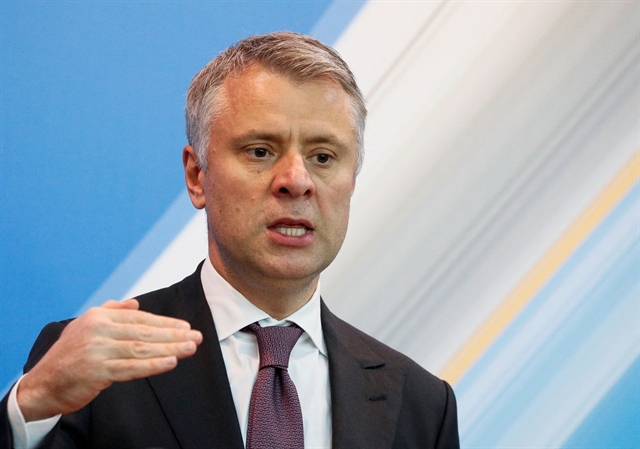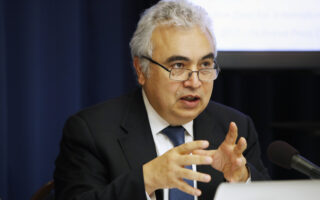Ukrainian gas chief sounds alarm

“Gazprom closed the gas valve on the Soyuz main gas pipeline in Russia,” the CEO of Naftogaz Yuriy Vitrenko points out in an exclusive interview with Kathimerini, openly laying the blame on the Russian side for any interruption in the flow of natural gas from Ukraine, which may result in a third of Europe’s supply from the region being disrupted.
The head of the Ukrainian national oil and gas company presents in great detail his version of the events that led to the current impasse and points out that Naftogaz had sent a proposal to Gazprom that it increase flows through an alternate station at Sudzha, stating that “it would be completely unreasonable for Gazprom not to deliver gas.”
Vitrenko accuses Russia of unscrupulous tactics with the goal of raising prices and exerting pressure on Germany over the Nord Stream 2 pipeline, and calls on the West to “to do everything it can to halt its reliance on Russian gas and oil.”
What is the reason for the complications in the gas supply?
On May 10, 2022, National Joint Stock Company Naftogaz of Ukraine sent an official letter to PJSC Gazprom in which we notified the Russian company of force majeure circumstances making it impossible to continue gas transmission through the Sokhranivka gas metering station and the Novopskov border compressor station. Currently, this refers to approximately one-third of the total gas transit volume. The next day at 6.55 a.m. the Russian gas transmission system operator, PJSC Gazprom, closed the gas valve on the Soyuz main gas pipeline in Russia. Thus, the gas transit from the Sokhranivka gas metering station was stopped. It’s not that Ukraine stopped the transit or that Ukraine somehow decided to interrupt or limit transit flows. It’s entirely the decision of Gazprom and Russia. And Gazprom and the occupation forces are responsible for that.
I should mention that May 10 was not the first time we had informed Gazprom about these problems; it was a couple of weeks before that. Both the operator and Naftogaz informed it Gazprom because we are the contract holder for transit. We informed Gazprom that these occupation forces decided to intervene in the operations of some critically important compressor stations on the territory of Ukraine responsible for transit.
‘The Russian occupiers have taken over our assets. Soldiers came first and said they just wanted to make sure everything was alright. Then they installed a new management’
If the Ukrainian operator cannot control these compressor stations, cannot control the IT system, it’s obvious that we cannot be held responsible for the operations on this occupied territory.
Are there any security issues regarding the infrastructure and the people in your company?
The Russian occupiers have taken over our assets. Soldiers came first and said they just wanted to make sure everything was alright. Then they installed a new management and increasingly restricted communication with the Ukrainian employees on the site. So now we hardly learn anything from our people.
Regarding the other infrastructure – it has been heavily shelled in different regions of Ukraine during these two months. Twenty of our company’s employees have been killed in this war.
How will this development affect gas supplies to Europe?
As usual, Gazprom is manipulating the European gas markets by cutting back supply through Ukraine, sanctioning entities in Germany and throughout Europe. This is being done to increase gas prices further, blackmail the Germans into giving the green light for Nord Stream 2, and using the profits to finance the Kremlin’s war in Ukraine. But the West needs to do everything it can to halt its reliance on Russian gas and oil.
Do you have any requests to make to Gazprom regarding the facilitation of the gas supply?
Unfortunately, currently we cannot see an increase in nomination for Sudzha. But as a matter of fact, what we see at the moment is that the flows through Sudzha did not increase, but at the same time the flows from Sokhranivka decreased. Both the operator and we, as an organizer of transit, suggested that Gazprom booked additional capacities at Sudzha, to move the transit from Sokhranivka to Sudzha at no additional cost. For Gazprom, there will be no financial impact. That is why it would be completely unreasonable for Gazprom not to deliver gas to their customers in Europe.





